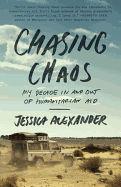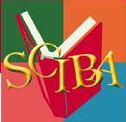 The Southern California Independent Booksellers Association expanded its annual trade show to two days this past weekend in downtown Los Angeles, and executive director Andrea Vuleta said attendance was up 30% over last year. Vuleta, who was given the directive from the SCIBA board to tweak the trade show when she took the association's helm in February, added that she will be open to feedback from both booksellers and publishers.
The Southern California Independent Booksellers Association expanded its annual trade show to two days this past weekend in downtown Los Angeles, and executive director Andrea Vuleta said attendance was up 30% over last year. Vuleta, who was given the directive from the SCIBA board to tweak the trade show when she took the association's helm in February, added that she will be open to feedback from both booksellers and publishers.
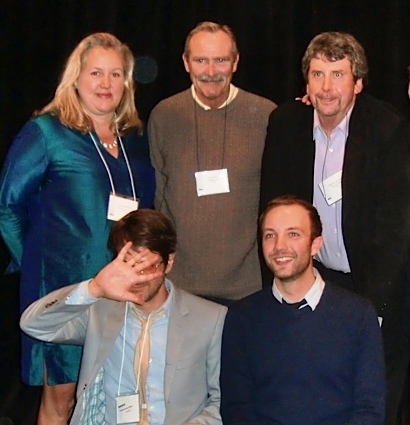 |
| SCIBA Book Award winners (l. to r., top row): Christine Moore, Tom McNeal, Robert Landau, (bottom) Pseudonymous Bosch (who is supposed to be anonymous, so he covers his face), Jon Klassen. |
What has not changed is SCIBA's ability to draw an eclectic mix of authors, which was evident by the nearly 40 featured at the Authors Feast and awards dinner on Friday evening. Mary Williams, SCIBA president, kicked off the banquet by presenting the Rep of the Year award to Penguin's Amy Comito. "I don't know a rep who doesn't work hard," Comito said. "So I accept this for everybody. It's what makes this a community."
Jon Klassen said he has "always edged toward the scary parts of picture books" long before he illustrated The Dark (Little, Brown), written by Lemony Snicket, which won the SCIBA picture book award. In accepting the award for middle grade fiction for Write This Book (Little, Brown) Pseudonymous Bosch joked that he always wanted to write a book he didn't have to write and that, for an author whose identity was supposed to remain a mystery, he still knew about half the booksellers in the room.
Tom McNeal acknowledged his wife, Laura, with whom he has collaborated on "several books and a couple of sons," as he accepted the YA award for Far Far Away (Knopf). Now that their sons are teenagers, McNeal said, he saw this new book as perhaps his last chance to write something that would mean something to them in their youth.
The Glenn Goldman Art, Architecture and Photography award went to Robert Landau for Rock 'n' Roll Billboards of the Sunset Strip (Angel City Press). The T. Jefferson Parker Mystery Award went to Debra Ginsberg for What the Heart Remembers (HarperCollins). Ginsberg, a former publishing member of SCIBA, was unable to attend the ceremony but asked Harper's Gabe Barillas (who happens to be her husband) to read a note thanking the SCIBA, which "has always been like family to me, and in a couple of cases are family."
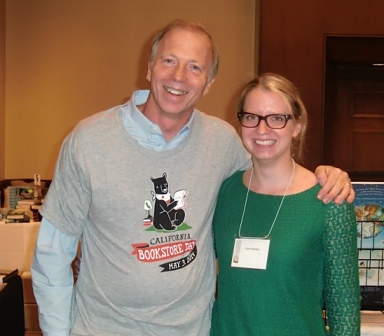 |
|
Penguin rep Tom Benton (sporting a California Bookstore Day T-shirt) on the floor with Dorling Kindersly rep Carol Stokke.
|
Chef Christine Moore, who quipped that she wore high heels for the occasion since she would be out of the kitchen, very graciously accepted the award for adult nonfiction for Little Flower: Recipes from the Café (Prospect Park Books). Though Marisa Silver was not in attendance to accept the adult fiction award for Mary Coin (Blue Rider), it seemed fitting that Tom Benton, the Penquin rep who has been championing the novel about the iconic Dust Bowl era photograph since last year's trade show, did the honors for her.
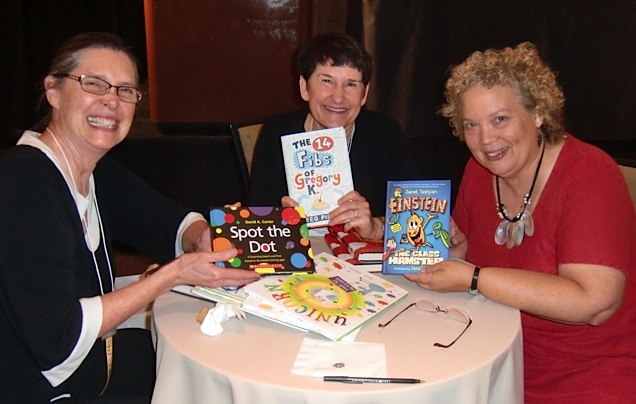 |
|
Author reception attendees: Kris Vreeland and Maureen Palacios from Once Upon a Time bookend Catherine Linke from Flintridge Books, whose debut YA novel, A Girl Called Flawless, will be published by St. Martin's in May.
|
At the children's breakfast the next morning, the speakers took attendees from the subjects of lice to mice, with stops in between at 19th-century locomotion and literature. David Shannon's Bugs in My Hair! (Blue Sky) might not seem appropriate to discuss over eggs, but Shannon said the topic (which his family faced head-on when his daughter got lice) was a "breeding ground--if you will--for humor." Teachers, he pointed out, are especially welcoming of a book that takes the stigma and shame out of dealing with lice. The book comes with a warning label about phantom itching. Brian Floca said that when he first started working on Locomotive (Simon & Schuster) he thought of trains as "tea cups on wheels," but after much research and even taking the controls of a locomotive himself, the author admitted it turned out to be one of the most complicated projects he had even done. He shared archival pictures of trains from the 1860s, along with shots he took on a road trip following the tracks of the first Transcontinental Railroad.
Gris Grimly--known for illustrating the work of Edgar Allan Poe in his own signature style--told breakfast attendees that he felt like, and was treated as, a monster himself, after 80% of his body was burned in an accident the summer before he started school. He called Mary Shelley's Frankenstein (HarperCollins) a multilayered a masterpiece that has long consoled and inspired misanthropes and the misunderstood. His interpretation progresses as the story does, he explained, from line drawings and black-and-white illustrations to sepia and even color artwork.
There was really only one mouse at the breakfast: Richard Peck's The Mouse with the Question Mark Tail (Dial), which is about a mouse during the time of Queen Victoria's Golden Jubilee. "We, who live in the age of her great-great granddaughter Elizabeth's Golden Jubilee, are testament that history repeats," observed Peck. And fiction serves a great purpose of bringing history to children, he concluded, by "writers in lonely rooms from booksellers at their posts," who offer them "pages turning to their future."
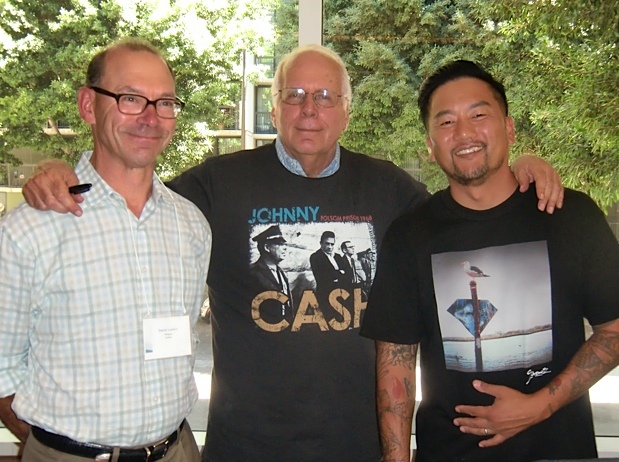 |
|
Luncheon speakers David Laskin, Robert Hilburn and Roy Choi.
|
At lunch, Roy Choi talked about L.A. Son: My Life, My City, My Food, the first book from Anthony Bourdain's Ecco Press imprint. The Korean-American Choi grew up in Los Angeles, where his family owned a restaurant, went on to become a chef at New York's Le Bernardin, and is credited with revolutionizing the food truck with the creation of the Korean taco truck, Kogi. Choi candidly shared that drugs changed him from a good student to a bad one, and that he hit bottom before landing in New York. The book, he said, helped him bridge these worlds. "There are Mr. Magoo moments and Weebles Wobbles moments--and then there's recipes, too," he said.
"Open the book of your family and you will be amazed what you find--I know I was," said David Laskin, who discussed his latest book, The Family: Three Journeys into the Heart of the Twentieth Century (Viking). Laskin had always known about the tycoon in his family, the chain-smoking 4'1" woman behind the Maidenform company, and the pioneer relative who tilled the soil in the Holy Land, but it was only through researching this book that he discovered a third ancestral branch that perished in the Holocaust. The larger question for the author was not how working on this book changed him as a Jew, but as a person. "It's the story of every American family," he said, because the history of all American families involves pain, success and death.
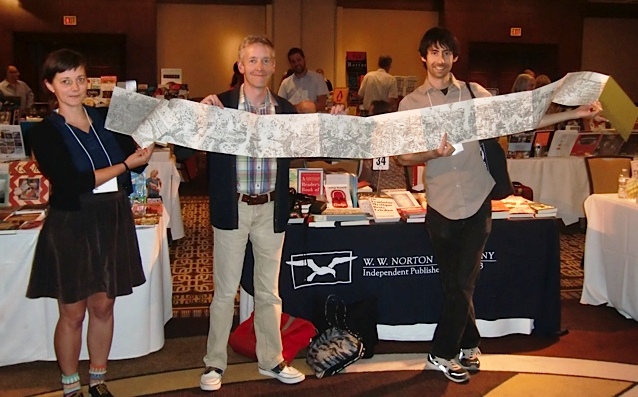 |
|
Norton rep Joe Murphy showing off The Great War by Joe Sacco, with a little help from Jenn Wittle and Arlo Klahr from Skylight Books.
|
If any celebrity's life and work represented the story of the individual's experience of rise and fall and rise again, it was Johnny Cash, and Robert Hilburn tried to capture that in Johnny Cash: The Life (Little, Brown). "People didn't just listen to Johnny Cash, they believed in Johnny Cash," he said. One of the biggest challenges for Hilburn was that sources told different versions of the same story. "Johnny Cash made stuff up all the time," he said. The two met as Cash was taking a career risk to perform at Folsom Prison, and they remained in contact, through Cash's TV success and Rick Rubin-engineered second revival in the 1990s, just before he died. "On his deathbed, his own message [of fall and redemption] had become real in his own life," said Hilburn.
From award-winners to featured authors, rep pick sessions and books discovered on the show floor, SCIBA offered plenty of fodder for those handselling opportunities that publishers, authors and readers count on. --Bridget Kinsella
 Today we welcome a very special addition to the Shelf Awareness team, our new associate editor, Alex Mutter. His name might sound familiar to readers because not only has he been freelance reporting for us since the beginning of the year, but he is, as you might have guessed, the younger son of our own co-founder and editor-in-chief, John Mutter. All of us at the Shelf took first notice of Alex when he began working at his hometown bookstore, Watchung Booksellers, Montclair, N.J., during high school. We gained a particular interest in his journey after he graduated from Sarah Lawrence College and became an intern for the German Book Office in New York, and quickly ended up writing many of stories for its daily e-newsletter, Publishing Perspectives. While we Shelfers could plainly see from his work that writing about the book business was in his blood, his father remained proud but interestingly quiet about his rising-star son. So when it came time, as the Shelf continues to grow, to hire an additional full time reporter, the staff knew perhaps before John would admit to himself that it should be Alex. I will personally never forget interviewing Alex, and him looking at me incredulously asking, "So you are wondering if I want to fly around the country, interview and write about booksellers and their stores, and take them for a drink afterwards? Uhm, yes, please, sign me up." Welcome him aboard at alex@shelf-awareness.com and learn more about Alex here. --Jenn Risko, publisher
Today we welcome a very special addition to the Shelf Awareness team, our new associate editor, Alex Mutter. His name might sound familiar to readers because not only has he been freelance reporting for us since the beginning of the year, but he is, as you might have guessed, the younger son of our own co-founder and editor-in-chief, John Mutter. All of us at the Shelf took first notice of Alex when he began working at his hometown bookstore, Watchung Booksellers, Montclair, N.J., during high school. We gained a particular interest in his journey after he graduated from Sarah Lawrence College and became an intern for the German Book Office in New York, and quickly ended up writing many of stories for its daily e-newsletter, Publishing Perspectives. While we Shelfers could plainly see from his work that writing about the book business was in his blood, his father remained proud but interestingly quiet about his rising-star son. So when it came time, as the Shelf continues to grow, to hire an additional full time reporter, the staff knew perhaps before John would admit to himself that it should be Alex. I will personally never forget interviewing Alex, and him looking at me incredulously asking, "So you are wondering if I want to fly around the country, interview and write about booksellers and their stores, and take them for a drink afterwards? Uhm, yes, please, sign me up." Welcome him aboard at alex@shelf-awareness.com and learn more about Alex here. --Jenn Risko, publisher





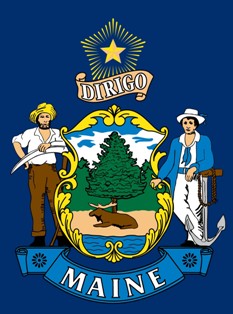 Effective October 6,
Effective October 6, 
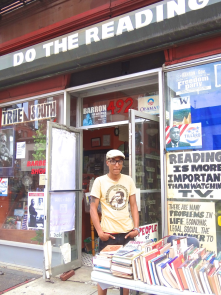

 Effective November 1, David Rosenbaum has been named director of the University of Missouri Press. He is currently director of product development and project management for the American Heart Association. Before joining the association, he was senior acquisitions editor at Elsevier, senior acquisitions editor at Delmar Cengage Learning and senior publisher and production manager at the Iowa State Press.
Effective November 1, David Rosenbaum has been named director of the University of Missouri Press. He is currently director of product development and project management for the American Heart Association. Before joining the association, he was senior acquisitions editor at Elsevier, senior acquisitions editor at Delmar Cengage Learning and senior publisher and production manager at the Iowa State Press. The Southern California Independent Booksellers Association expanded its annual trade show to two days this past weekend in downtown Los Angeles, and executive director Andrea Vuleta said attendance was up 30% over last year. Vuleta, who was given the directive from the SCIBA board to tweak the trade show when she took the association's helm in February, added that she will be open to feedback from both booksellers and publishers.
The Southern California Independent Booksellers Association expanded its annual trade show to two days this past weekend in downtown Los Angeles, and executive director Andrea Vuleta said attendance was up 30% over last year. Vuleta, who was given the directive from the SCIBA board to tweak the trade show when she took the association's helm in February, added that she will be open to feedback from both booksellers and publishers.




 Executive director Len Vlahos called the past 12 months "a year of transition" for BISG that "reflects the transition most of you find yourself in, a thoughtful and methodical transition." It's not a jump from caterpillar to butterfly, he added, but more like "a backwards compatible software upgrade."
Executive director Len Vlahos called the past 12 months "a year of transition" for BISG that "reflects the transition most of you find yourself in, a thoughtful and methodical transition." It's not a jump from caterpillar to butterfly, he added, but more like "a backwards compatible software upgrade." Determined "to act now to be prepared for tomorrow," BISG has been "rethinking our mission and brand," as chair Ken Michaels, global COO for Macmillan Science and Education, put it. Some 650 members responding to a BISG survey on the organization's future said that their major concern is, not surprisingly, the digital transformation. However, No. 2 on the list was "other," reflecting that concerns are becoming more "individual and fractured," Michaels said.
Determined "to act now to be prepared for tomorrow," BISG has been "rethinking our mission and brand," as chair Ken Michaels, global COO for Macmillan Science and Education, put it. Some 650 members responding to a BISG survey on the organization's future said that their major concern is, not surprisingly, the digital transformation. However, No. 2 on the list was "other," reflecting that concerns are becoming more "individual and fractured," Michaels said. Speaking on the panel on "profiting from transformational change," Madeline McIntosh, president and COO of Penguin Random House, said that the biggest challenge for the newly merged publisher is "how to make sure the greatest number of consumers find the greatest number of our books as possible."
Speaking on the panel on "profiting from transformational change," Madeline McIntosh, president and COO of Penguin Random House, said that the biggest challenge for the newly merged publisher is "how to make sure the greatest number of consumers find the greatest number of our books as possible."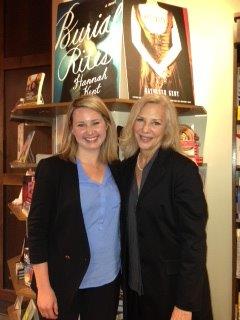 Last Thursday,
Last Thursday, 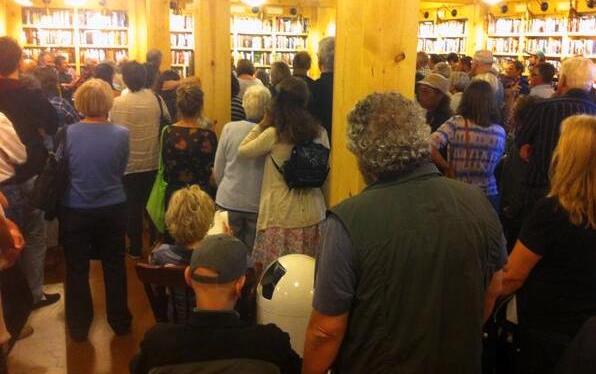
 An SRO crowd attended the grand opening of DIESEL in Larkspur, Calif., at the Marin Country Mart, yesterday, which featured assorted festivities, libations and comestibles, along with great company and music. As part of the celebration, Pulitzer Prize-winning poet and essayist Gary Snyder read and signed.
An SRO crowd attended the grand opening of DIESEL in Larkspur, Calif., at the Marin Country Mart, yesterday, which featured assorted festivities, libations and comestibles, along with great company and music. As part of the celebration, Pulitzer Prize-winning poet and essayist Gary Snyder read and signed.
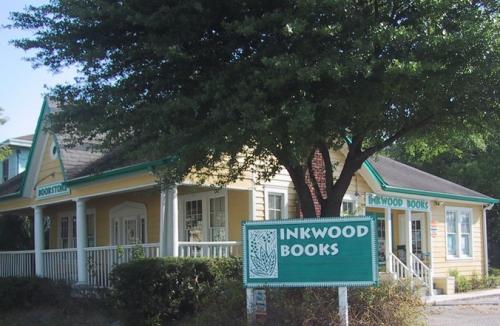 Congratulations to
Congratulations to 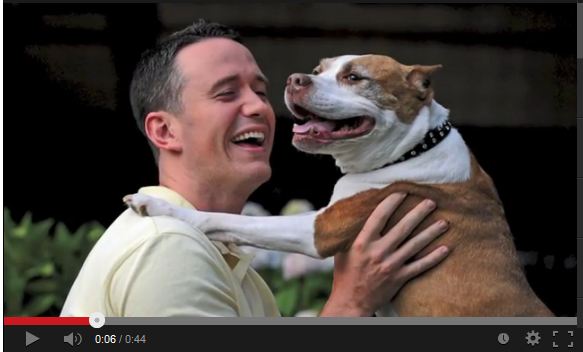 Devoted: 38 Extraordinary Tales of Love, Loyalty, and Life with Dogs
Devoted: 38 Extraordinary Tales of Love, Loyalty, and Life with Dogs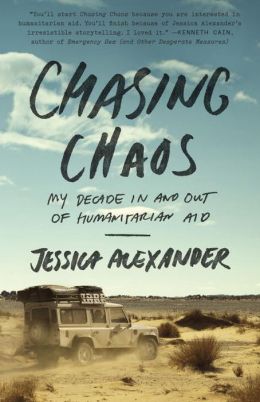 What Mary Roach does for the alimentary canal in Gulp and Robin Nagle does for garbage collecting in Picking Up, Jessica Alexander does for global catastrophe in Chasing Chaos--entertainingly enlightening us with a hands-on look at something we'd really rather not see. Whether prowling refugee camps in sub-Saharan Africa, combing the tsunami ravaged ruins of South Asia or helping out in the post-earthquake shambles of Haiti, Alexander shares her own weaknesses as she provides humanitarian relief to victims of war and weather.
What Mary Roach does for the alimentary canal in Gulp and Robin Nagle does for garbage collecting in Picking Up, Jessica Alexander does for global catastrophe in Chasing Chaos--entertainingly enlightening us with a hands-on look at something we'd really rather not see. Whether prowling refugee camps in sub-Saharan Africa, combing the tsunami ravaged ruins of South Asia or helping out in the post-earthquake shambles of Haiti, Alexander shares her own weaknesses as she provides humanitarian relief to victims of war and weather.